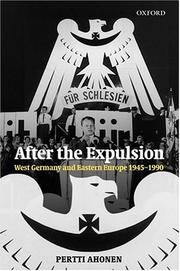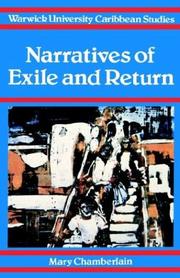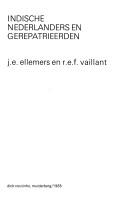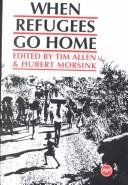| Listing 1 - 10 of 269 | << page >> |
Sort by
|

ISBN: 0719070708 Year: 2005 Publisher: Manchester : Manchester university press,
Abstract | Keywords | Export | Availability | Bookmark
 Loading...
Loading...Choose an application
- Reference Manager
- EndNote
- RefWorks (Direct export to RefWorks)

ISBN: 0199259895 0191717452 1280905255 Year: 2003 Publisher: Oxford New York Oxford University Press
Abstract | Keywords | Export | Availability | Bookmark
 Loading...
Loading...Choose an application
- Reference Manager
- EndNote
- RefWorks (Direct export to RefWorks)
Book
ISBN: 9264649913 9264378774 Year: 2020 Publisher: Paris : OECD Publishing,
Abstract | Keywords | Export | Availability | Bookmark
 Loading...
Loading...Choose an application
- Reference Manager
- EndNote
- RefWorks (Direct export to RefWorks)
For many OECD countries, how to ensure the safe and dignified return to their origin countries of migrants who do not have grounds to remain is a key question. Sustainable Reintegration of Returning Migrants: A Better Homecoming reports the results of a multi-country peer review project carried out by the OECD, with support from the German Corporation for International Cooperation (GIZ) on behalf of the Federal Ministry for Economic Cooperation and Development (BMZ).
Book
ISBN: 3700182457 Year: 2017 Publisher: Vienna, Austria : Austrian Academy of Sciences Press,
Abstract | Keywords | Export | Availability | Bookmark
 Loading...
Loading...Choose an application
- Reference Manager
- EndNote
- RefWorks (Direct export to RefWorks)
The tremendous loss to the humanities and social sciences in the 20th century resulting from the expulsion of thousands of scholars and artists from Austria and Central Europe has been well documented. The present collection of articles deals with a related but under-researched aspect - it combines analyses of the complex bureaucratic and the ideological obstacles which exiled scholars from a wide range of disciplines in the humanities and social sciences and creative artists faced when they were willing to return and specific essays documenting the varying opportunities for individual returnees to influence the development of their different disciplines after the end of the Nazi tyranny. The 27 essays highlight the roles of a number of returnees as generous mentors for younger scholars and their encouragement of modernization and internationalization in an atmosphere of stagnation and provincialism in the universities. Eminent experts in history, philosophy or political science who had returned were hampered by the denial of full academic appointments despite their highly stimulating initiatives, while theatre directors had a relatively strong impact on the programs in the theaters and the other media. The volume also illustrates personal factors, including the understandable hesitation of prominent intellectuals such as Oskar Morgenstern or Ernst Krenek to give up the advantages of US American citizenship for academic positions, especially in a country exposed to political threats in the Cold War; but the essays also bring out the fact that quite a few of the émigrés remained exiles on both sides of the Atlantic. A particular strength of the volume is the detailed consideration of the fortunes and the influence of the impressive array of exiled Austrian economists. Many of them returned from Britain, helping to shape economic theory and Austrian economic policy, even though necessarily mainly from outside the universities, while transatlantic exiles largely remained in the USA.

ISBN: 031216484X Year: 1997 Publisher: New York (N.Y.) : St. Martin's press,
Abstract | Keywords | Export | Availability | Bookmark
 Loading...
Loading...Choose an application
- Reference Manager
- EndNote
- RefWorks (Direct export to RefWorks)

ISBN: 9062836313 Year: 1985 Publisher: Muiderberg : Coutinho,
Abstract | Keywords | Export | Availability | Bookmark
 Loading...
Loading...Choose an application
- Reference Manager
- EndNote
- RefWorks (Direct export to RefWorks)

ISBN: 0865434336 9780865434332 Year: 1994 Publisher: Trenton (N.J.): Africa world press,
Abstract | Keywords | Export | Availability | Bookmark
 Loading...
Loading...Choose an application
- Reference Manager
- EndNote
- RefWorks (Direct export to RefWorks)
Refugees --- Repatriation --- Return migration

ISBN: 9782738452962 2738452965 Year: 1997 Publisher: Paris: CIEMI,
Abstract | Keywords | Export | Availability | Bookmark
 Loading...
Loading...Choose an application
- Reference Manager
- EndNote
- RefWorks (Direct export to RefWorks)
Chileans --- Exiles --- Return migration
Book
Year: 2009 Publisher: [Washington, D.C. : World Bank,
Abstract | Keywords | Export | Availability | Bookmark
 Loading...
Loading...Choose an application
- Reference Manager
- EndNote
- RefWorks (Direct export to RefWorks)
"The contribution of return migrants to economic development in source countries can be significant. Overseas savings of returnees may lead to improvements in household welfare and provide liquidity for investments in the face of credit market failures. Labor market experience and skills acquired abroad may also lead migrants to find occupations higher in the skill and remuneration spectrum upon return. This study uses the 2005 Albanian Living Standards Measurement Study Survey and estimates the impact of international migration experience on the occupational mobility of return migrants vis a vis working-age Albanian residents that never migrated. Controlling for the non-random nature of international migration and return, the results show that past migration experience increases the likelihood of upward occupational mobility. Exploring the heterogeneity of impact by host country indicates that the positive effect of past migration experience on upward occupational mobility is driven by past migration experience in Italy and countries further a field, while past migration experience in Greece does not exert any significant impact on mobility outcomes. The results, which are consistent across different sample specifications and outcome variables measuring occupational mobility, hint at the link between migration and human/financial capital formation among migrants and foster optimism concerning the positive effect of return migration on economic development. This insight is particularly important since remittances from permanent migrants, which have fueled the impressive growth performance of the country in the recent era, may taper off in the medium to long term with the decline in out-migration and growing global economic woes. "--World Bank web site.
Book
Year: 1997 Publisher: Paris : OCDE,
Abstract | Keywords | Export | Availability | Bookmark
 Loading...
Loading...Choose an application
- Reference Manager
- EndNote
- RefWorks (Direct export to RefWorks)
| Listing 1 - 10 of 269 | << page >> |
Sort by
|

 Search
Search Feedback
Feedback About UniCat
About UniCat  Help
Help News
News